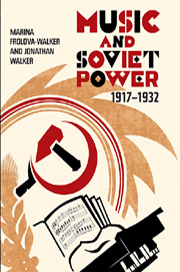Book contents
- Frontmatter
- Contents
- Preface
- Acknowledgements
- Note on transliteration
- Chronology of Political and Musical Events
- October 1917–18: Out of Chaos
- 1919: Depression and Fever
- 1920: Bureaucracy on the Rise
- 1921: Should I stay or should I go?
- 1922: Just Like the Old Days?
- 1923: The Birth of ASM and RAPM
- 1924: ASM in the Ascendant
- 1925: Equilibrium
- 1926: Guests from the West
- 1927: Celebrations
- 1928: At the Crossroads
- 1929: Velikiy perelom – The Great Turning Point
- 1930: RAPM's Glorious Year?
- 1931: RAPM's Fortunes Turning
- 1932: The Rules Change
- Key to Acronyms and Institutional Bodies
- Glossary of Names
- Bibliography
- Index
1922: Just Like the Old Days?
Published online by Cambridge University Press: 05 April 2013
- Frontmatter
- Contents
- Preface
- Acknowledgements
- Note on transliteration
- Chronology of Political and Musical Events
- October 1917–18: Out of Chaos
- 1919: Depression and Fever
- 1920: Bureaucracy on the Rise
- 1921: Should I stay or should I go?
- 1922: Just Like the Old Days?
- 1923: The Birth of ASM and RAPM
- 1924: ASM in the Ascendant
- 1925: Equilibrium
- 1926: Guests from the West
- 1927: Celebrations
- 1928: At the Crossroads
- 1929: Velikiy perelom – The Great Turning Point
- 1930: RAPM's Glorious Year?
- 1931: RAPM's Fortunes Turning
- 1932: The Rules Change
- Key to Acronyms and Institutional Bodies
- Glossary of Names
- Bibliography
- Index
Summary
The introduction of NEP soon swept away the austerity of War Communism. Great quantities of food were suddenly made available in the shops and at the many private stalls, from staple items through to the most extravagant delicacies. There were queues even for items costing upwards of a million roubles. Those who could not hope to buy were glued to the windows. Luxury goods filled the displays at the newly opened department stores bearing fashionable acronyms: GUM and TsUM. The writer Kornei Chukovsky, walking the streets of central Moscow, observed that ‘everyone wore the same expression – happiness. Men are made happy by card games, races, wine and women; women with lascivious, drunken faces push their chests against the shop windows on Kuznetsky, where there are silks and diamonds to be seen … ‘ While all this happiness was chiefly the preserve of the newly enriched NEPmen, the rest of society also began to enjoy greater comforts: workers were paid the arrears they were owed, allowing them to experience some of the exuberance of life under NEP. As the student Litvinov noted in his diary, ‘people began to work, eat, dress up and multiply’. Music filled the streets: ‘they sing and play in their homes, on the boulevards, and above all in the countless cabarets, cafes, corner bars, restaurants, tea rooms, and canteens’. 1 October that year saw the birth of home-grown jazz, at a concert given by Valentin Parnakh's band.
- Type
- Chapter
- Information
- Music and Soviet Power, 1917–1932 , pp. 67 - 84Publisher: Boydell & BrewerPrint publication year: 2012



